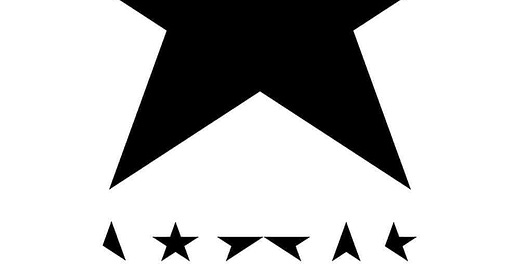Before my children were born, my wife and I woke to the sound of BBC6 Music on a DAB radio. This alarm call was just before 7 am; we still had work offices to attend physically, back then. A few mornings had entertainment news breaking overnight, and I remember several of them clearly.
One of these was the death of James Gandolfini, the actor, of course, most famous for playing Tony Soprano. Shaun Keaveny's much-missed breakfast show eulogised and played, what else, Alabama Three's 'Woke Up This Morning'. The following year, both Shaun and music news stallion Matt Everitt were infectiously giddy at Kate Bush's announcement of a series of live shows - I somehow managed to get tickets to one of these.
There are two Shaun and Matt mornings on BBC 6Music linked intrinsically and irrevocably in my mind; 8th Jan 2013 and 11th Jan 2016. The former was a happy day; After a decade of silence as a solo artist1, David Bowie surprised us with a new single on his 66th birthday, 'Where Are We Now?' a lucid, nostalgic song that threw back to his previous work in tone, context and content.
The latter was a sad day; only two days earlier, I'd posted on Facebook that I was enjoying Bowie's ★, his 31st and final, studio album and that it wasn't quite as leftfield as some of the reviews had suggested. I remember the cracks in Matt and Shaun's voices halting ever so slightly as they confirmed the news - just before my phone started to light up with push messages. I was sitting down at our breakfast table, and I was surprised at just how sad it made me feel. I wasn't distraught or overcome; I've been a fan all my adult life but never had a connection like those who grew up with him.
My other recollection of that day, other than taking my retired2 Ziggy Stardust mug in to work just for one day, was listening to Blackstar a couple of times and aside from the inevitable earworm of "Where the fuck did Monday go?" I dwelled on 'I Can't Give Everything Away'. Long before the idea of The Run Out Grooves was born, I did think about what type of legacy a known final track3 would be. Looking back over our entries so far, the only other final track from a final studio album we've discussed is Nirvana's In Utero, and I'm not sure even Cobain knew that was their last album at the time.
SixAs for the song itself, amongst all the experimental jazz and rock on the album, the last two songs are the more conventional. Even that drum loop binds them, one segueing into the next. 'Dollar Days' is slight more mythologising, looking to the past and the future, but there is plenty of substance to 'I Can't Give Everything Away'. David Bowie recorded the song in the last set of Blackstar sessions in March 2015. After that drum loop passes, the rest of the track has live drum parts that sound synthetic - a hallmark of the record and an indicator that Bowie was keeping his ear to the ground and taking on board influences like Death Grips and Kendrick Lamar.
While we have those contemporary references, the song can't avoid delving into Bowie's past in three specific areas. Firstly we have the harmonica sound, which we can't help but compare with the one we hear on Low's 'A New Career In A New Town'. Even with no lyrics, that song evokes the idea of moving on with its title; we know that Bowie has done the ultimate version of that by ascending from this astral plane. Secondly, we have the Donny McCaslin saxophone work that calls back to the title track and Bowie’s learning of the instrument as a young boy in the late 1950s. And finally, we have the Robert Fripp-esque guitar line from Ben Monder more prominent than elsewhere on the record and, in the dying embers of the album, allowed to break out from the lush and dense Moog synthesiser sounds and take flight as Bowie's vocal steps back.
As for the lyrics, they take on a different light when you know he knew he was near the end. He talks of the prodigal son returning home, playing up the mythology that casts him as an alien that came down, sang songs and showed us how terrible the internet would become. The pulsing reminds us that there is a yin and yang, birth and death. He arrives, he departs.
It's a bittersweet song as he knows this is it. He can't give any more to us. There's also the other meaning - He couldn't tell us about his illness, and he had to hold something back; David Bowie was, in the end, a performance for David Jones, and he had a line drawn somewhere and wouldn't allow a crossover. The line that also heads this entry, "Seeing more and feeling less". It sounds like his illness had made him wiser and appreciated the good in the world but diminished his physical form.
Ultimately Bowie leaves us with an epic going away present in the album itself and this song, the final moments of a master showman who knew you must always face the curtain with a bow.
He provided backing vocals for TV On The Radio, Scarlett Johansson and Arcade Fire while his solo career was on hiatus.
Since my first post University job, I have always changed my work mug with each new job or company. These have all been music-related for the past decade, and on starting a new role, the old mug retires the home collection. My Rise and Fall of Ziggy Stardust And The Spiders From Mars Mug - bought from Bowie's V&A show - had been used from 2014-2015.
Yes, there were the extra Lazarus tracks and No Plan, but this is the final track on the final album!





